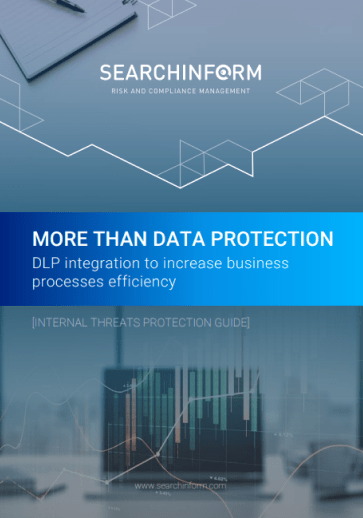The Philippines Data Privacy Act of 2012: A Comprehensive Overview
- Background and Purpose
- Scope and Applicability
- Key Provisions of Philippines Data Privacy Act of 2012
- Data Processing Principles
- Rights of Data Subjects
- Obligations of Data Controllers and Processors
- Implications for Businesses
- Steps to Compliance
- Assessment:
- Policy Development:
- Security Measures:
- DPO Appointment:
- Training:
- Continuous Improvement:
- Data Protection Officer (DPO) Role
- Penalties for Non-Compliance
- Criminal Penalties
- Administrative Fines
- Impact on Reputation and Trust
- Benefits of Complying With the Philippines Data Privacy Act of 2012
- Benefits of SearchInform Solutions for Philippines Data Privacy Act of 2012 Compliance
Background and Purpose
The Data Privacy Act of 2012 (Republic Act No. 10173) was enacted in the Philippines to address the growing risks associated with the collection, processing, and storage of personal data. With the rise of the internet and digital technologies, the need to protect individual privacy became urgent. The DPA 2012 aims to strike a balance between safeguarding people's fundamental right to privacy and allowing the legitimate flow of information necessary for innovation and economic growth.
The law was influenced by international standards on data privacy. It establishes a framework for protecting personal information, holding organizations accountable for data handling practices, and granting individuals greater rights over their personal data.
Scope and Applicability
The Philippines Data Privacy Act of 2012 has a broad scope. It applies to the processing of personal data in both the government and the private sectors. The DPA covers any individual or organization ("personal information controller" or "personal information processor") that collects, stores, uses, or otherwise handles personal information.
"Personal information" is broadly defined under the law. It refers to any information that can directly or indirectly identify an individual. This includes sensitive personal details such as name, address, contact numbers, biometric data, government-issued identifiers, medical records, and more.
The DPA 2012 mandates that the processing of personal data must adhere to the principles of transparency, legitimate purpose, and proportionality. This means individuals should be aware of how their data is used, the use should be for valid reasons, and the extent of data collection and processing should be reasonable and necessary.
Key Provisions of Philippines Data Privacy Act of 2012
Data Processing Principles
The Philippines Data Privacy Act of 2012 outlines core principles that must be followed by organizations when handling personal data:
- Transparency: Individuals should be informed about how their personal data is collected and used. This involves clear privacy notices and accessible information.
- Legitimate Purpose: Personal data should only be collected and processed for specified, legitimate purposes stated to the individual.
- Proportionality: Data collection and processing should be limited to what is necessary to fulfill the stated purpose.
Rights of Data Subjects
The law gives individuals (data subjects) significant rights over their personal information:
- Right to be Informed: Data subjects have a right to know the details about how their data is processed.
- Right to Access: They can request access to their personal data held by an organization.
- Right to Rectification: Data subjects can request to correct inaccurate or incomplete information.
- Right to Erasure or Blocking: In certain circumstances, individuals can request deletion or blocking of their personal data.
- Right to Damages: Individuals may claim compensation for damages suffered due to violations of their data privacy rights.
Obligations of Data Controllers and Processors
Data Controllers are the entities that determine the purposes and means of processing personal data. Their responsibilities include:
- Obtaining Consent: Generally, they need explicit consent of the individual to process personal data.
- Implementing Security Measures: Implementing appropriate technical, organizational, and physical measures to protect personal data.
- Data Breach Notification: Notifying the National Privacy Commission and affected individuals in case of a data breach.
- Appointment of a Data Protection Officer (DPO): Organizations that meet certain criteria are required to appoint a DPO.
Data Processors are entities that process personal data on behalf of a controller. They must:
- Process data only according to the controller's instructions.
- Maintain confidentiality and security of personal data.
Implications for Businesses
The Philippines Data Privacy Act of 2012 has significant implications for how businesses in the Philippines operate. Companies must re-examine their data practices to ensure compliance. This might involve:
Privacy Impact Assessments (PIAs): PIAs are no longer optional for many companies. They are a systematic process for identifying and analyzing the potential privacy risks associated with new projects, processes, or systems that involve handling personal data. PIAs help companies proactively address risks, make informed decisions about their data practices, and demonstrate accountability. A well-conducted PIA may highlight the need to change how data is collected or introduce additional security measures.
Revising Privacy Policies: Privacy policies must move beyond being just legal documents. Under the DPA, they need to be clear, concise, and easily accessible to individuals. They should transparently explain what personal data is collected, why it's collected, how it's used, who it's shared with, and an individual's rights regarding their data. If your privacy policy is primarily focused on obtaining basic consent, a thorough revision aligned with the DPA's principles is necessary.
Data Security Measures: The DPA emphasizes the security principle. Companies must implement safeguards appropriate to the sensitivity of the personal data they handle. Technical solutions like encryption (both for data at rest and in transit), robust access controls, and intrusion detection systems form a core part of security. Additionally, strong organizational procedures, such as clear policies on data access, secure disposal of data, and incident reporting protocols, are equally crucial.
Data Breach Response Plans: Companies can't prevent every data breach, but they are obligated to minimize the harm. A detailed data breach response plan outlines the steps to take in case of a breach. This includes identifying and containing the breach, conducting a timely investigation, notifying the National Privacy Commission (when required), notifying affected individuals, and taking steps to prevent future breaches.
Training Employees: Data privacy isn't just a responsibility of IT or compliance teams. Every employee who interacts with personal data needs to understand their obligations under the DPA. Regular training should cover topics like what constitutes personal data, how to handle it securely, recognizing signs of a potential breach, how to respond to individuals' requests about their data, and company-specific privacy procedures.

Steps to Compliance
Assessment:
To begin your compliance journey, you must first comprehensively identify all types of personal data that your organization collects, processes, and stores. For each type of data, determine the specific purpose for its collection and the legal justification for processing it (e.g., consent, legitimate interest, contractual necessity). Carefully map how this personal data moves throughout your organization, including any third parties (like cloud service providers or marketing partners) that may also handle the data. Finally, conduct a thorough assessment of the potential risks to the security and privacy of this data at every stage of its journey within your organization's control.
Policy Development:
Develop or thoroughly revise your organization's privacy policies and procedures to ensure full alignment with the principles and requirements of the Data Privacy Act. These policies should transparently communicate how personal data is collected, why it's used, when and with whom it might be shared, and the robust security measures in place to protect it. Additionally, establish clear procedures for obtaining valid consent from individuals, responding to requests from data subjects exercising their rights (access, rectification, etc.), reporting and managing data breaches promptly, and maintaining the accuracy of personal data.
Security Measures:
Implement rigorous technical and organizational security measures to protect personal data from unauthorized access, accidental disclosure, malicious alteration, or destruction. Utilize strong encryption for sensitive data at rest and in transit. Enforce strict access controls, limiting access to personal data on a need-to-know basis. Maintain updated security software and systems. Conduct regular security assessments and audits to proactively identify and mitigate evolving vulnerabilities, ensuring the ongoing effectiveness of your security measures.
DPO Appointment:
Thoroughly evaluate whether your organization meets the criteria outlined in the Data Privacy Act for the mandatory appointment of a Data Protection Officer (DPO). If required, carefully select and designate a qualified individual to take on this role. The DPO will be responsible for guiding compliance efforts, responding to individuals exercising their data privacy rights, and acting as the liaison between your organization and the National Privacy Commission (NPC).
Training:
Develop and implement a comprehensive training program for all employees who handle personal data, encompassing roles from managers and IT staff to customer service and HR personnel. This training should clearly explain their obligations under the Data Privacy Act, emphasizing the critical importance of protecting personal data and ensuring they understand how to respond appropriately to data subject requests and potential security incidents.
Continuous Improvement:
Establish a process for ongoing monitoring, review, and continuous improvement of your data privacy practices. Stay up-to-date on any revisions to the Data Privacy Act and relevant regulations or guidelines from the National Privacy Commission (NPC). Implement regular internal audits and assessments to proactively verify compliance with both legal requirements and evolving industry best practices, demonstrating your organization's commitment to data protection.
Address any identified deficiencies promptly and update policies and procedures as needed.
By following these steps, businesses can take a proactive approach to comply with the Philippines Data Privacy Act of 2012, mitigate risks, and build trust with customers, partners, and regulators.
Data Protection Officer (DPO) Role
A DPO is a key figure in ensuring DPA compliance, particularly for organizations that meet specific criteria. The DPO's responsibilities include:
- Advising: Providing guidance to the organization on interpreting and implementing the DPA 2012's requirements.
- Monitoring: Overseeing data practices to ensure they align with the law and identifying potential risks.
- Liaison: Serving as the contact point for individuals exercising their rights and for the National Privacy Commission.
- Education: Training employees about the DPA and data protection best practices.
- Assessments: Conducting privacy impact assessments to evaluate data processing activities.
- Breach Management: Playing a key role in responding to and managing data breaches.
from different sources:
Penalties for Non-Compliance
The Philippines Data Privacy Act of 2012 includes strict penalties for violations. Non-compliance can result in:
Criminal Penalties
The Philippines Data Privacy Act of 2012 outlines various offenses that carry criminal penalties, including imprisonment and fines. Some examples of these offenses are:
- Unauthorized Processing of Personal Information: Processing personal information without the individual's consent or lawful grounds can result in imprisonment of 1 to 3 years and a fine of at least 500,000 pesos but not exceeding 2 million pesos.
- Accessing Personal Information Due to Negligence: Unauthorized access to personal information due to negligence or reckless disregard of security policies can result in imprisonment of 1 to 3 years and a fine analogous to unauthorized processing.
- Unauthorized Disclosure of Personal Information: Knowingly or recklessly disclosing personal information without proper authorization carries imprisonment of 1 to 5 years and a fine of at least 500,000 pesos but not exceeding 1 million pesos.
- Malicious Disclosure: This offense carries a heavier penalty – imprisonment of 3 to 6 years and a fine of 1 million to 5 million pesos.
- Concealment of Security Breaches: Failure to notify the National Privacy Commission and affected individuals about a security breach can result in imprisonment of 1.5 to 5 years and a fine of 500,000 to 1 million pesos.
The maximum penalties apply when the violations involve sensitive personal information or when the personal information of at least 100 individuals is affected.
Administrative Fines
In addition to criminal penalties, the National Privacy Commission (NPC) has the authority to impose administrative fines for DPA violations. These fines can be substantial, and the amount will depend on the nature of the violation and factors like the number of affected individuals. The NPC has guidelines for determining the appropriate level of fines.
Impact on Reputation and Trust
Data privacy failures, whether in the form of a major data breach, an unlawful sale of personal data, or mishandling of sensitive information, can profoundly erode public trust in a company. News of such incidents spreads rapidly in the digital age, leading to negative publicity that tarnishes a brand's image.
Customers, who entrust their data to businesses, feel betrayed when their privacy is violated. This breach of trust leads to a loss of customer confidence, with people actively choosing to take their business to competitors who prioritize data protection. Ultimately, data privacy failures can inflict significant reputational damage, impacting a company's ability to attract new customers, retain existing ones, and in severe cases, threaten its very survival.
Benefits of Complying With the Philippines Data Privacy Act of 2012
Complying with the Philippines Data Privacy Act of 2012 (Republic Act No. 10173) offers several benefits for both individuals and organizations. Some of these benefits include:
- Protection of Personal Information: Compliance with the Data Privacy Act ensures that personal information is handled and processed securely, reducing the risk of unauthorized access, disclosure, or misuse.
- Enhanced Trust and Reputation: Organizations that comply with the Data Privacy Act demonstrate their commitment to protecting the privacy rights of individuals. This enhances trust among customers, clients, and partners, leading to a positive reputation in the market.
- Legal Compliance: Compliance with the Data Privacy Act ensures that organizations are operating within the legal framework set by the Philippine government. This reduces the risk of facing legal penalties, fines, or sanctions for non-compliance.
- Minimized Data Breach Risks: By implementing security measures and best practices outlined in the Data Privacy Act, organizations can minimize the risk of data breaches and cyberattacks, protecting sensitive information from unauthorized access.
- Avoidance of Financial Losses: Data breaches and non-compliance with data privacy regulations can result in significant financial losses for organizations, including fines, legal fees, and compensation payments to affected individuals. Compliance helps mitigate these risks.
- Competitive Advantage: Compliant organizations may gain a competitive advantage over non-compliant counterparts by showcasing their commitment to data privacy and security, which can be a distinguishing factor for customers and partners.
- International Business Opportunities: Compliance with the Data Privacy Act can facilitate international business opportunities, as it demonstrates alignment with global data protection standards, which may be required for partnerships or contracts with entities from other jurisdictions.
- Improved Data Management Practices: The Data Privacy Act encourages organizations to adopt robust data management practices, including data inventory, risk assessment, and incident response planning, leading to improved overall data governance.
- Protection of Employee Information: Compliance with the Data Privacy Act ensures that employee information is handled with care, respecting their privacy rights and maintaining confidentiality, which can enhance employee trust and satisfaction.
- Social Responsibility: By complying with data privacy regulations, organizations fulfill their social responsibility to protect the privacy rights of individuals, contributing to a safer and more trustworthy digital environment.
Overall, compliance with the Philippines Data Privacy Act of 2012 is crucial for organizations to safeguard personal information, maintain legal compliance, and build trust with stakeholders, thereby mitigating risks and gaining various strategic advantages in today's data-driven landscape.
Benefits of SearchInform Solutions for Philippines Data Privacy Act of 2012 Compliance
SearchInform Solutions offers various benefits for compliance with the Philippines Data Privacy Act of 2012:
Data Discovery and Classification: SearchInform's solutions help businesses identify and classify sensitive personal data across their digital environment. This capability assists in fulfilling the requirements of the Data Privacy Act related to understanding the flow and handling of personal data.
Risk Assessment and Mitigation: The platform enables organizations to conduct comprehensive risk assessments by identifying vulnerabilities, potential data leakages, and non-compliance issues. By proactively addressing these risks, businesses can better adhere to the security requirements outlined in the Data Privacy Act.
Data Loss Prevention (DLP): SearchInform Solutions include DLP features that monitor and prevent unauthorized access, sharing, or leakage of sensitive data. This functionality aligns with the Data Privacy Act's mandate to implement measures to protect personal information from unauthorized access or disclosure.
Incident Response and Investigation: In the event of a data leak or security incident, SearchInform's solutions facilitate swift incident response and investigation. This capability is crucial for complying with the Data Privacy Act's requirement to report breaches to the National Privacy Commission and affected data subjects in a timely manner.
Compliance Monitoring and Reporting: SearchInform's platform provides tools for ongoing compliance monitoring and reporting, enabling organizations to demonstrate adherence to the Data Privacy Act's requirements. This includes tracking access to personal data, maintaining audit logs, and generating compliance reports for internal use or regulatory purposes.
Employee Monitoring and Training: SearchInform's solutions offer employee monitoring features that help organizations ensure compliance with data privacy policies and procedures. Additionally, the platform can be used for employee training and awareness programs to educate staff about their responsibilities under the Data Privacy Act.
Centralized Data Management: By centralizing data management and governance processes, SearchInform Solutions streamline compliance efforts and ensure consistency in data handling practices. This centralized approach supports compliance with the Data Privacy Act's principles of accountability and transparency.
Scalability and Flexibility: SearchInform's solutions are scalable and adaptable to the evolving needs of businesses of all sizes. Whether an organization is expanding its operations or implementing new data privacy requirements, the platform can accommodate changes while maintaining compliance with the Data Privacy Act.
Ready to safeguard your business against data leakages and ensure compliance with the Philippines Data Privacy Act of 2012? Take action today with SearchInform Solutions. Our comprehensive suite of data security and compliance tools empowers businesses to discover, protect, and monitor sensitive personal data, mitigating risks and maintaining regulatory compliance. Schedule a consultation with our experts to learn how SearchInform can help your organization achieve data privacy excellence and build trust with customers and regulators.
Don't wait until it's too late—protect your data, protect your reputation, and protect your business with SearchInform!
Extend the range of addressed challenges with minimum effort
Company news
SearchInform uses four types of cookies as described below. You can decide which categories of cookies you wish to accept to improve your experience on our website. To learn more about the cookies we use on our site, please read our Cookie Policy.
Necessary Cookies
Always active. These cookies are essential to our website working effectively.
Cookies does not collect personal information. You can disable the cookie files
record
on the Internet Settings tab in your browser.
Functional Cookies
These cookies allow SearchInform to provide enhanced functionality and personalization, such as remembering the language you choose to interact with the website.
Performance Cookies
These cookies enable SearchInform to understand what information is the most valuable to you, so we can improve our services and website.
Third-party Cookies
These cookies are created by other resources to allow our website to embed content from other websites, for example, images, ads, and text.
Please enable Functional Cookies
You have disabled the Functional Cookies.
To complete the form and get in touch with us, you need to enable Functional Cookies.
Otherwise the form cannot be sent to us.

Subscribe to our newsletter and receive a bright and useful tutorial Explaining Information Security in 4 steps!

Subscribe to our newsletter and receive case studies in comics!







